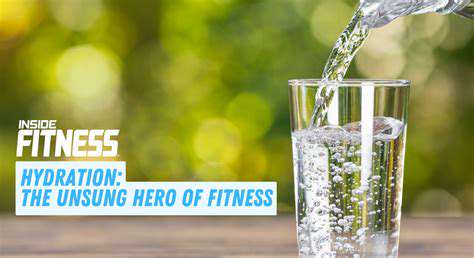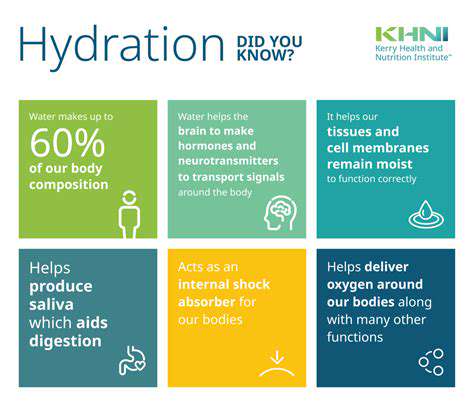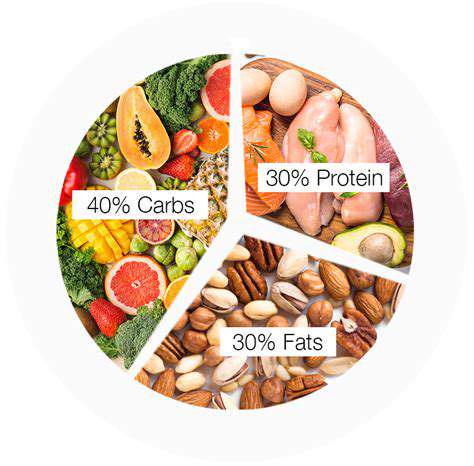How to Recover Faster After Workouts [Tips & Techniques]
Understanding the role of macronutrients—carbohydrates, proteins, and fats—is essential for creating a balanced diet. Carbohydrates are your body's primary source of energy, providing the fuel needed for physical activity and daily tasks. Proteins are crucial for building and repairing tissues, contributing significantly to muscle growth and overall body composition.
Fats, often misunderstood, are also vital for hormone production, nutrient absorption, and cell structure. Choosing healthy fats, like those found in avocados, nuts, and olive oil, is essential for optimal health.
Micronutrients: Supporting Essential Functions
Micronutrients, including vitamins and minerals, play vital supporting roles in various bodily functions. Vitamins are organic compounds that facilitate a wide range of biochemical processes, while minerals serve as crucial components in enzyme function and various bodily processes. A deficiency in these essential nutrients can lead to a myriad of health problems.
Ensuring adequate intake through a diverse diet of fruits, vegetables, and whole grains is crucial for maintaining optimal levels of vitamins and minerals, promoting overall well-being and supporting bodily functions.
Hydration: The Unsung Hero of Health
Often overlooked, hydration is critical for maintaining optimal bodily functions. water is essential for transporting nutrients, regulating body temperature, and aiding in digestion. Dehydration can lead to fatigue, decreased cognitive function, and reduced physical performance. Staying adequately hydrated is crucial for overall well-being.
Drinking plenty of water throughout the day, especially before, during, and after physical activity, is essential for maintaining optimal hydration levels and ensuring optimal bodily function.
Prioritizing Whole Foods for Long-Term Well-being
Prioritizing whole, unprocessed foods is key to a healthy diet. These foods are packed with essential nutrients and fiber, promoting satiety, supporting digestion, and contributing to overall well-being. Selecting whole grains, fruits, vegetables, lean proteins, and healthy fats is crucial for a balanced and nutritious diet. Avoiding highly processed foods, sugary drinks, and excessive amounts of unhealthy fats is a crucial step in achieving optimal health.
These foods not only provide essential nutrients but also support a healthy gut microbiome, which plays a crucial role in digestion, immunity, and overall health. A diet rich in whole foods promotes sustainable well-being for the long term.
Hydration: The Unsung Hero of Post-Workout Recovery

Hydration's Crucial Role in Recovery
Proper hydration is paramount for optimal post-workout recovery. Dehydration can significantly hinder your body's ability to repair muscle tissue and replenish energy stores. This is because water is essential for transporting nutrients to the muscles and removing metabolic waste products, both crucial for the repair process. Without adequate hydration, the body struggles to effectively perform these functions, leading to delayed recovery and potentially increased risk of injury.
Electrolyte Balance: Beyond Just Water
While water is vital, electrolytes like sodium, potassium, and magnesium play a crucial role in maintaining hydration and overall bodily functions. Electrolytes are lost through sweat during exercise, and replenishing them is essential for restoring proper hydration and preventing muscle cramps and fatigue. Sports drinks or electrolyte-rich foods can help replenish these lost minerals, further enhancing recovery.
Muscle Repair and Growth: Hydration's Impact
Hydration is directly linked to muscle repair and growth. Sufficient water intake aids in protein synthesis, a process vital for rebuilding and strengthening muscle fibers damaged during exercise. The body utilizes water as a medium for transporting amino acids, the building blocks of protein, to the muscles, facilitating optimal repair and growth.
Improved Performance in Subsequent Workouts
Staying well-hydrated throughout the day, especially before, during, and after exercise, positively impacts subsequent workouts. Hydration significantly improves your body's ability to perform, increasing endurance and reducing fatigue. When adequately hydrated, your body can perform at its peak, leading to better results in your training sessions.
Restorative Sleep: The Hydration Connection
Adequate hydration is also linked to better sleep quality. A well-hydrated body can regulate its temperature more efficiently, which is crucial for a restful sleep. Dehydration can disrupt sleep patterns and lead to fatigue, hindering the body's ability to recover and prepare for future workouts. Consistent hydration habits can contribute to a more restorative sleep cycle, allowing the body to fully recuperate.
Long-Term Health Benefits: Hydration's Broad Impact
Beyond athletic performance, consistent hydration plays a crucial role in overall long-term health. Hydration supports various bodily functions, from regulating body temperature to transporting nutrients throughout the body. Staying properly hydrated can contribute to maintaining healthy skin, aiding digestion, and potentially reducing the risk of certain health conditions. It's a fundamental aspect of overall well-being.
The Power of Active Recovery: Gentle Movement for Faster Healing
Understanding Active Recovery
Active recovery is a crucial component of any effective recovery plan, particularly when dealing with injuries or intense physical exertion. It involves engaging in low-intensity physical activity that promotes blood flow and lymphatic drainage without causing further stress or strain on the body. This gentle movement helps to flush out metabolic waste products, reduce muscle soreness, and improve overall circulation, setting the stage for faster healing and reduced recovery time. By incorporating active recovery into your routine, you can significantly enhance your body's ability to repair and rebuild after strenuous activity.
Think of it like a gentle refresh for your muscles and tissues. Instead of complete rest, which can sometimes lead to stiffness and delayed healing, active recovery keeps your body moving in a way that supports the natural repair process. This is especially important for athletes and individuals involved in high-impact activities.
Benefits of Gentle Movement
The benefits of incorporating gentle movement during recovery extend beyond just physical well-being. Low-impact activities like walking, light swimming, or gentle stretching can significantly reduce muscle tension and stiffness, promoting better flexibility and range of motion. This can also have a positive impact on mood and mental well-being, as physical activity releases endorphins, natural mood boosters.
Furthermore, active recovery can help prevent the buildup of lactic acid, a common culprit in muscle soreness and fatigue. By promoting blood flow and oxygen delivery to the muscles, active recovery aids in the efficient removal of this waste product, leading to quicker recovery from workouts and less discomfort.
Choosing the Right Active Recovery Activities
The key to effective active recovery is selecting activities that are appropriate for your needs and current physical condition. Gentle walking, cycling at a low intensity, or a short yoga session are all excellent options. The important factor is to choose activities that don't exacerbate any existing injuries or pain.
Active Recovery and Injury Prevention
Active recovery plays a crucial role in injury prevention, particularly for individuals involved in high-impact activities. By incorporating gentle movement into their routine, athletes can maintain muscle flexibility and strength, reducing the risk of strains, sprains, and other injuries. Consistent active recovery helps to keep muscles and joints prepared for the demands of training or competition.
Active Recovery and Muscle Soreness
Muscle soreness, a common occurrence after intense exercise, can be significantly mitigated through active recovery. Light movement promotes blood flow, which helps to flush out metabolic waste products that contribute to soreness. This reduces inflammation and promotes faster recovery, allowing you to return to your normal activities sooner.
Active Recovery and Flexibility
Maintaining flexibility is paramount for overall physical health and performance. Active recovery, through gentle stretching and low-impact movements, helps to improve joint mobility and maintain muscle elasticity, preventing stiffness and improving range of motion. This is essential for athletes and anyone seeking to maintain a high level of physical fitness and prevent potential injuries.
Active Recovery and Mental Well-being
Beyond the physical benefits, active recovery can also positively impact mental well-being. Gentle movement can reduce stress, improve mood, and promote relaxation. This is because physical activity releases endorphins, which have mood-boosting effects. Incorporating active recovery into your daily routine can contribute to a healthier mind and body.
Contribution limits vary by state and plan. It's essential to research the specific limits for the state's 529 plan you are considering. Eligibility for 529 plans often depends on the relationship between the account holder and the beneficiary. Typically, the beneficiary is a dependent or family member who is pursuing or will pursue higher education.
Strategic Sleep for Muscle Repair & Growth
Optimizing Your Sleep Schedule
Consistent sleep schedules are crucial for muscle repair and growth. Establishing a regular sleep-wake cycle, even on weekends, helps regulate your body's natural circadian rhythm. This rhythm dictates hormone release, including growth hormone, which plays a pivotal role in protein synthesis and muscle recovery. Aiming for 7-9 hours of quality sleep per night is a good guideline to support optimal recovery and muscle growth after strenuous workouts.
Disrupting this rhythm through inconsistent sleep schedules can negatively impact your body's ability to repair and rebuild muscle tissue, leading to decreased performance and hindering progress in your fitness goals. A predictable sleep schedule helps your body anticipate rest periods, optimizing its recovery processes.
The Power of Deep Sleep
Deep sleep, also known as slow-wave sleep, is a critical phase of the sleep cycle. During this stage, your body releases growth hormone, which is essential for muscle protein synthesis and tissue repair. Prioritizing deep sleep is vital for maximizing the benefits of your workouts and ensuring that your body effectively repairs the micro-tears in muscle fibers caused by exercise.
Techniques to promote deep sleep include establishing a relaxing bedtime routine, avoiding caffeine and alcohol before bed, and creating a dark, quiet, and cool sleep environment. These strategies can help you transition smoothly into deep sleep and reap its restorative benefits.
Nurturing a Supportive Sleep Environment
Creating a conducive sleep environment is paramount for quality sleep. A dark, quiet, and cool room promotes better sleep quality and duration, leading to more effective muscle recovery. Consider using blackout curtains, earplugs, or a white noise machine to minimize distractions and create an optimal sleep sanctuary.
A comfortable mattress and pillows are also key components of a supportive sleep environment. Invest in high-quality bedding that aligns with your preferences and body type. A supportive mattress and pillows will help prevent discomfort and promote better sleep quality, leading to improved muscle recovery.
Nutrition for Enhanced Sleep and Recovery
Your diet significantly impacts your sleep quality and ability to recover from workouts. Consuming a balanced diet rich in essential nutrients provides your body with the building blocks needed for muscle repair and growth. Prioritizing protein-rich foods, complex carbohydrates, and healthy fats can support muscle recovery and promote better sleep quality.
Avoid large meals or sugary snacks close to bedtime, as these can disrupt sleep patterns. Additionally, staying hydrated throughout the day is crucial for optimal bodily functions and can indirectly contribute to a more restful night's sleep, optimizing your ability to recover from intense workouts.
Mindfulness and Stress Management for Better Sleep
Stress and anxiety can severely impact your sleep quality. Chronic stress can lead to difficulty falling asleep and staying asleep, hindering your body's ability to repair and rebuild muscle tissue. Incorporating stress-reducing practices, such as mindfulness meditation, yoga, or deep breathing exercises, can help manage stress levels and promote better sleep.
Establishing a calming bedtime routine, including taking a warm bath or reading a book, can also signal to your body that it's time to wind down and prepare for sleep. Prioritizing stress management and relaxation techniques can significantly improve your sleep quality and support your body's recovery processes after workouts.








![Guide to Heart Health for Women [Unique Risks & Prevention]](/static/images/26/2025-05/BeyondtheBasics3AAddressingSpecificConcerns.jpg)

![How to Improve Your Pull Up Strength [Beginner to Advanced]](/static/images/26/2025-06/NutritionandRecovery3AEssentialComponents.jpg)

